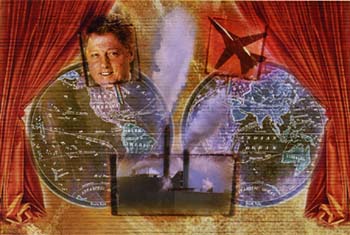 |
 |
| current issue |  |
past issues |  |
send a letter/news |  |
address update |  |
advertise |  |
about us |  |
alumni home |
Features
Running with the CurrentCurrent events bring more than news to the classroom
By Elibet Moore Chase '81

|
Last april, a UNH student heading over to the MUB for a late-morning cup of coffee would have been in for an informal education as well. There, on one side of the eatery, over 100 students, professors and staff members had assembled to discuss the recent NATO bombing in Kosovo. Like many Americans who were upset or puzzled by this turn of events in our nation's foreign affairs, the students in Janet Polasky's Western Civilization class wanted to learn more. So they organized this University-wide forum, inviting an assortment of professors with expertise in central Europe and promoting the event thoughout campus.
Among those attending was UNH sophomore Teuta Hajrizaj, a 20-year-old ethnic Albanian who grew up in Quincy, Mass., and spent six weeks every other summer in Kosovo. As she listened to her fellow students question the benefit of the NATO intervention, her anger flared. "Do you realize the history?" she responded when it was her turn to speak. "Do you remember Hitler?" For Hajrizaj, the so-called ethnic cleansing in Kosovo was history repeating itself.
Vladimir Pistola, a Serbian doctoral student in American history, listened quietly. He felt sympathy for Hajrizaj and the many Kosovars he had seen weeping on national television, but he also worried about his Serbian mother in Belgrade, whom he had tried to comfort over the telephone. Pistola had a broader view. He spoke up, sharing with the crowd his understanding of the complexities of the situation and how he thought the most promising solution would encompass the entire region—a sort of new Marshall Plan.
Many other students, and professors, offered their viewpoints and questions. Was the U.S. involvement economically motivated? Did it play into strategic interests or was it simply the continuation of historic conflicts? The forum offered an opportunity to look at the conflict from different perspectives and to consider the complexities of the issue.
The Kosovo forum is a recent example of how current events bring to life the principles UNH students are studying in class. "In my Western Civ class, I refer to the drawing of the boundaries of what is now Yugoslavia, which opens up a discussion with students of what they have read in the newspaper about Kosovo. It's my hope that by the end of the semester, all the students will have not only developed the habit of reading the paper and listening to 'All Things Considered' on National Public Radio, but will have become critical readers and listeners," Polasky says.
Many professors require students to subscribe to a national newspaper or bring clippings to class. Political science department chair Tom Trout says that in the beginning of a course, he will use current events to illustrate the course's principles; by the end of the course, the direction has switched and the students end up exporting the course's principles and applying them to current events.
The following excerpts are from an informal journey across campus to see how a cross-section of UNH professors are using three examples of current events: the Clinton presidency, global warming and the war in Kosovo. Professors use issues that apply to their curriculum, but they share the hope that students will leave UNH able to think in broader terms, using critical thinking to seek solutions to such complex problems as war, pollution and politics. As associate professor of economics Marc Herold puts it, "The world is an intellectual theater." And for UNH students every year, the curtain is up.
On the Clinton Presidency
Janet Polasky, HistoryClass: Gender and Political Ideology
Aline Kuntz and I have taught our Gender and Political Ideology course each primary season. Some very interesting women have spoken to our class in the past. Three years ago, I wrote to invite Hillary Clinton. The class laughed at the beginning of the semester when we told them that in addition to Madeleine Kunin, the former governor of Vermont and undersecretary of education, we had invited Mrs. Clinton. And Aline and I were quite surprised when the UNH president's office called the first week in December to tell us that she was coming. The student Democrats had also invited her to campus. She was wonderful. She talked individually with each of the students in the class who were sitting in the front row of the Field House. That she could discuss complex policy issues without notes from the podium as well as notice a little girl who was crying in the front row impressed the students and led to some fascinating discussions of stereotypes.
Page: 1 2 3 Next>Easy to print version
blog comments powered by Disqus

